“Concrete block walls,” Bob said.
Weaver nodded: “Okay.”
“What happened with the idea of offering a reward for the dope buckets?” Lucas asked.
Weaver brightened. “I talked to my boss, he thinks it’s going to fly. Not a done deal yet, but I’ll know before the end of the day. They’re hot to get something. Anything.”
After talking with Weaver, Bob and Lucas went back to their rooms, collected their separate files of FBI reports, carried them down to the now-empty conference room and began pulling the interviews with a variety of crime-connected street operators in Miami and Fort Lauderdale, looking for drug hustlers, and found none.
They were still at it when they got a call from a crime scene tech in Miami. Lucas put it on speakerphone. “I pulled that wet suit and weighed it,” the tech said. “It came in a tich under six pounds.”
“Did much of it get burned up?” Lucas asked.
“No. It’s melted, but intact. It’s all stuck together, which is why we couldn’t get anything out of it,” she said. “We could tell it’s a seven millimeter, which probably means the diver was going deep and cold. It was somewhat protected from the fire because that boat has a head . . . a toilet . . . and that’s where we found the wet suit.”
Bob: “Wait—there’s a cabin? We thought it was an open fishing boat.”
“No cabin, just a head under the center console. Big enough to stand up in, there’s a toilet and even a tiny sink, but it’s tight.”
Lucas: “The wet suit was where? On the floor?”
“Yes. The diver had peeled it off and left it. We assume he was changing when the chase started and he was in a hurry.”
“Now. That is interesting,” Bob said, when they were off the phone.
They spent a half hour calling wet suit manufacturers and talking to the owner of a Lauderdale dive shop. When they were done, Bob said, “It all fits with the wet suit in the toilet stall.”
“The head,” Lucas said.
“Yeah, the head.”
Weaver had looked in on them a couple of times, to see if they’d actually learned anything. He showed up again as Bob made his comment about it all fitting with the toilet stall.
“What fits?” He looked from Lucas to Bob and back to Lucas.
Lucas said, “We got the weight on that wet suit—a little under six pounds, which is consistent with a size small in a seven-millimeter suit. We called a dive shop and asked how much trouble it was to get out of a dive suit. Turns out, they’re made to fit really tight and it’s a struggle to get both in and out of one. The suit was found in the head, where it would have been even more of a struggle, because the head on that boat is tiny. Hardly room to turn around.”
“All right, I believe you. So what?” Weaver asked.
“Hall says the diver was short and thin . . . quite short. About five-six, or even shorter, we think. The diver went into the head to change. Why was that?”
Weaver shook his head. “I don’t know. You tell me.”
“Because she wanted some privacy, away from the men on the boat.”
Weaver stared, then then put up both hands to fend them off: “Oh, no. No, nope, you’re shitting me now.”
Lucas said, “We’re not a hundred percent on it, of course. But that suit was right for an average-sized athletic woman.”
“Fuck me.”
Bob to Weaver: “Did you look at any women divers?”
“I don’t think so. It never occurred to anyone that . . . aw, hell.” Weaver agreed that the FBI task force agents would try to track down an average-sized, athletic, professional or semipro female diver.
Lucas asked, “Where would they get their tanks refilled?”
“We checked all those, but we’ll recheck, asking about women,” Weaver said. “The thing is, you can buy a scuba compressor for two or three grand. If you’re willing to torch a quarter-million-dollar boat, you’re probably willing to spend three grand on your own compressor. We did check compressor shipments into the three-county area here and tracked them down. Nothing happening there.”
Bob: “Anything on the reward idea?”
Weaver shook his head: “Not yet.” He looked at his watch: “It takes a while to get to Miami. You guys should get going. I’ll get started on this female diver. If she’s local, she should be identifiable.”
CHAPTER
FIVE
Because they’d be on the street, Lucas and Bob traded their shorts for jeans but stayed with the guayabera shirts and the cross-training shoes, and headed south to Miami. The Northside Miami-Dade District’s police station had the South Florida look that was almost an architectural style, a boxy red-and-white concrete building with useless pillars out front and a clutch of flagpoles by the street.
They were taken to a conference room populated by eight plainclothes cops, a bunch of soda cans, and a couple of cups of coffee. The cops stopped talking when the marshals were shown in, and somebody said, “See, I told you: they’re not FBI.”
“You’re right, we’re not,” Lucas said, as he and Bob pulled out chairs and sat down. The narcs, Lucas thought, looked like a collection of postal clerks or shoe salesmen with added facial hair, as did narcs in most places. “We’re marshals. We’re looking for the guys who killed the Coast Guardsmen last summer. We’re new on the case and we work differently than the FBI guys.” Long pause. “Good as they are.”
There were a number of snorts and a little laughter, and a guy with a beard held up a hand and said, “I’m DEA and for official reporting purposes, I’m not laughing.”
“You looked like you were laughing,” somebody said.
The DEA agent ignored that and asked, “What do you want?”
“Names and locations of a few long-term dealers who might hear things and who might talk to cops if they’re put under enough pressure,” Bob said. “We’re hoping that one of them can point us at the specific organization that brought the heroin up the coast.”
“That could get you dinged up,” somebody said.
“We’ve been dinged up before and we’re still here,” Lucas said.
Another cop: “Yeah, we looked you up. You do have a few dings.”
Yet another one: “If we give you names, you’ll be fucking with our sources.”
“We lie a lot,” Lucas said. “They won’t know it comes from you. In fact, they may be calling you for help.”
“Exactly what are you going to do?” the DEA agent asked.
Lucas told them.
Some of the narcs were skeptical and walked; others gave them names.
Like Tobin Cain’s.
Tobin Cain was known on the street as Foot-Long, not because of any personal measurement, but because he dealt his dope out of a back booth at a Subway franchise near downtown Miami. The Subway was located on a hot, shabby, black-tar street with weeds growing up through the cracks. Cain’s business was basically okay with the franchisee, because nothing boosted traffic like dopers with the munchies.
Cain liked the place for the free refills and the Wi-Fi; a sloppy-fat black guy, he was sitting in a back booth, wearing an aqua-and-orange Miami Dolphins jersey and hat, the hat worn forward. He was poking at an iPad. The DEA agent, whose name was Ramon Herrera, and who smelled strongly of tobacco, pointed him out from behind the red-rock steps of a closed, life-battered Jesus the Savior Church, across the street from the Subway.
“Make sure you keep his hands where you can see them,” Herrera said. “He doesn’t carry a gun anymore, because of the felonies, but he still carries a screwdriver. Those can hurt, especially if he sticks it in your heart.”
“Will he have some dope on him?” Bob asked.
“He usually phones out to an assistant, but one reason I suggested Foot-Long is that he fired his guy last week. A kid named Dope.”
Читать дальше
![Джон Сэндфорд Ocean Prey [calibre] обложка книги](/books/384313/dzhon-sendford-ocean-prey-calibre-cover.webp)



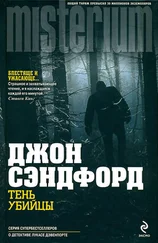
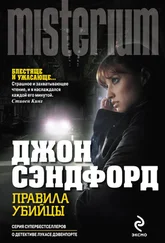
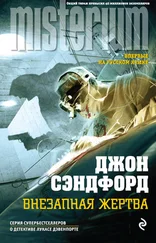
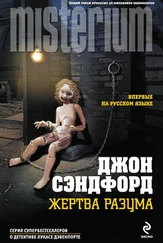


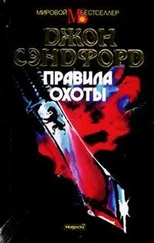
![Джон Ирвинг - Viename asmenyje [calibre]](/books/384315/dzhon-irving-viename-asmenyje-calibre-thumb.webp)
![Джон Ирвинг - Vandens metodas [calibre]](/books/384316/dzhon-irving-vandens-metodas-calibre-thumb.webp)